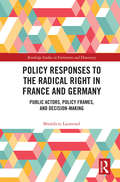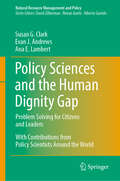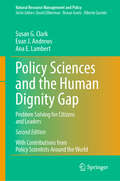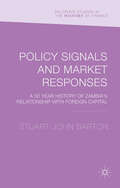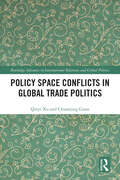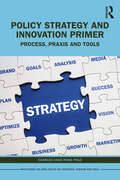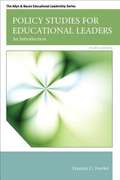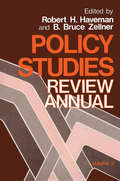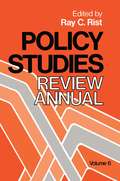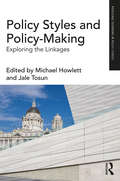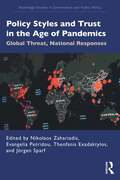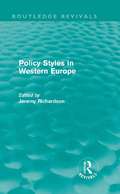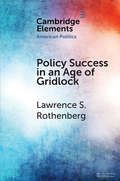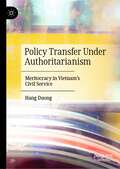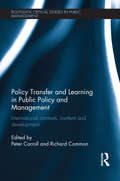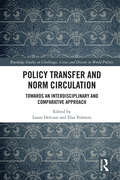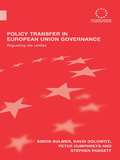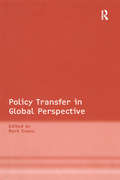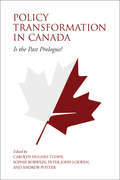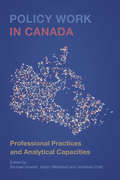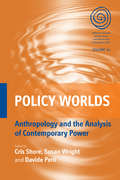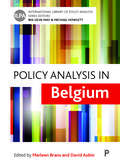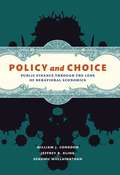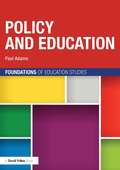- Table View
- List View
Policy Responses to the Radical Right in France and Germany: Public Actors, Policy Frames, and Decision-Making (Extremism and Democracy)
by Bénédicte LaumondBased on research fieldwork conducted in France and Germany, this study seeks to explain how public actors have taken part in the regulation of the expression of right-wing radicalism. The author compares these two neighbouring countries which have framed the struggle against right-wing radicalism differently. German political and state actors have constructed a public policy responding to political radicalism, whilst in France, the radical right is primarily handled in the political arena. The text evaluates how these two Western European democracies address the paradox of tolerance (i.e. the fact that liberal democracies may restrain rights they value, such as freedom of speech, in order to repress intolerant forces that threaten democracy). This book is core reading for scholars and students interested in the spread of far-right politics in contemporary democracies.
Policy Sciences and the Human Dignity Gap: Problem Solving for Citizens and Leaders (Natural Resource Management and Policy #58)
by Susan G. Clark Evan J. Andrews Ana E. LambertThis book presents a comprehensive and actionable framework for individuals and leaders seeking to promote human dignity within healthy environments. Rooted in the policy sciences approach, it equips readers with the essential concepts, tools, and skills necessary to address indignity and unhealthy conditions collectively. Despite international commitments and domestic laws advocating for human dignity, a glaring "human dignity gap" persists in numerous regions and problem contexts. This book sheds light on this disparity, examining its manifestations in global environmental change, development efforts, water insecurity, wildfires, human-wildlife conflict, access to public health, and much more. While existing scholarship often focuses on legal rights, the authors emphasize untapped opportunities for everyday citizens and leaders to foster human dignity within their communities and beyond. By offering fresh perspectives, practical concepts, and exercises, this book empowers readers to bridge the performance gap, ultimately enabling the realization of human dignity from the grassroots level. It provides innovative strategies and frameworks to address this pressing global issue, making it an invaluable resource for scholars, policymakers, and concerned citizens alike.
Policy Sciences and the Human Dignity Gap: Problem Solving for Citizens and Leaders (Natural Resource Management and Policy #60)
by Susan G. Clark Evan J. Andrews Ana E. LambertThis book presents a comprehensive and actionable framework for individuals and leaders seeking to promote human dignity within healthy environments. Rooted in the policy sciences approach, it equips readers with the essential concepts, tools, and skills necessary to address indignity and unhealthy conditions collectively. Despite international commitments and domestic laws advocating for human dignity, a glaring "human dignity gap" persists in numerous regions and problem contexts. This book sheds light on this disparity, examining its manifestations in global environmental change, development efforts, water insecurity, wildfires, human-wildlife conflict, access to public health, and much more. While existing scholarship often focuses on legal rights, the authors emphasize untapped opportunities for everyday citizens and leaders to foster human dignity within their communities and beyond. By offering fresh perspectives, practical concepts, and exercises, this book empowers readers to bridge the performance gap, ultimately enabling the realization of human dignity from the grassroots level. It provides innovative strategies and frameworks to address this pressing global issue, making it an invaluable resource for scholars, policymakers, and concerned citizens alike.
Policy Signals and Market Responses: A 50 Year History of Zambia's Relationship with Foreign Capital (Palgrave Studies in the History of Finance)
by Stuart John BartonThe study presents archival evidence to show how President Kaunda raised political and economic exclusivity in Zambia in the early years of Zambia's independence, and how this retarded capital investment. Despite formal reforms and a new government, this institutional mechanism still dominates and constrains Zambia's political economy today.
Policy Space Conflicts in Global Trade Politics (Routledge Advances in International Relations and Global Politics)
by Qinyi Xu Chuanjing GuanPolicy Space Conflicts in Global Trade Politics delves into the structure, driving forces and contemporary influencing factors of trade relations dynamics, providing insights into the present and future trajectories of the global trade order.The post-pandemic global governance challenges combined with the concurrent, if not concomitant, escalation of economic rivalries between great powers are catalysing a weakening of the liberal international order, undermining the very foundations upon which contemporary global production network is built. With the return of geopolitical tensions, the conflict over global governance versus state governance has again become the nexus where global trade politics are contested and negotiated. This book presents the Policy Space Conflict framework, an analytical framework that diverges from extant concepts of policy diffusion, power transition, socialisation and neo-liberal institutionalist models of analyses, and is instead advanced as a framework that renews the classic concept of ‘policy space’ – the space left for one to freely use preferred national policy instruments when integrated into the globalisation and institutionalisation process in the past decades. The tensions inherent in and arising from policy space can be captured in the term ‘policy space conflict’, illuminating the dynamic shifts regarding the convergence of rules under globalisation and de-convergence concerns of states. This book emphasises the underlying logic and motivating rationale that lie beneath the evolution of ‘policy space conflict’ by theoretically revisiting the concept, providing an overview of its forms in history since the Bretten Woods and transitions from market-oriented to strategy-based. This exploration is examined using case studies drawn from real-world trade politics, which encompasses discussions on the decline of multilateralism, the asymmetry in development between the Global South and Global North and China–US institutional contestation.This book will be of interest to scholars in the fields of international relations, law, political economy, political science, economics and international trade as well as a broad range of audiences who are concerned of global trade politics in times of global uncertainty.
Policy Strategy and Innovation Primer: Process, Praxis and Tools (Routledge-Solaris Focus on Strategy, Wisdom and Skill)
by Charles Chao PhuaPhua focuses on applying the best of corporate strategy and innovation tools and praxis into the policy process with the aim of devising a coherent policy strategy–innovation framework and process. Government and business strategies differ in their operating assumptions and variables, but the strategy process is more similar than is often perceived. Phua debunks the government versus business dichotomy and demonstrates the potential for cross-learning between both domains. Readers will benefit the most by reading this book in tandem with Phua’s other works on strategy also featured in this series. This book is an essential primer for academics, practitioners and learners of public policy, strategy, innovation and applied problem-solving.
Policy Studies for Educational Leaders: An Introduction
by Frances FowlerFuture educational leaders and actual K-12 administrators get a solid, comprehensive grounding in education policy and the policy process and the important political theories upon which it is based. Included is essential background information about the cultural, economic, demographic, and institutional roots of educational policy and an incisive look at the history of educational policy.
Policy Studies: Volume 3
by Bruce B. ZellnerEvery editor of the Policy Studies Review Annual brings a unique perspective to bear in selecting articles to be included. This perspective reflects varying methodological and disciplinary judgments, varying judgments on what the field of policy studies or policy analysis is and where it should be going, and varying judgments regarding the quality of articles which are or claim to be in the field. Because it is the objective to assemble a set of essays which are both interesting and topical, there will be varying perspectives on these matters as well. The volume clearly reflects the editors perspectives. They are explicit about these judgments and perspectives, and then let the content of the volume speak for itself. First, we are both economists. As a result, the general topics selected and the articles chosen under each topic tend to emphasize economics more than the other disciplines involved in the field of policy studies—sociology, psychology, political science, law, and so on. This emphasis is clearly seen by comparing the contents of volume I (edited by Stuart Nagel, a political scientist) and volume II (edited by Howard Freeman, a sociologist) with that of this volume. Second, the editors have a particular view of what policy studies or policy analysis is. That view has several aspects. In the first place, they feel that the field of policy studies or policy analysis must define itself, and this definition will develop as researchers do just what the title of the field says—study or analyze policies. A corollary of this view is that we place a low weight on papers which discuss the policy process or reforms in policy-making, relative to papers which analyze a policy, a policy proposal, or a problem which leads to calls for policy action.
Policy Studies: Volume 6
by Ray C. RistThe sixth edition of this annual collection of the year's best work in policy studies. Contributions in this volume reflect the increased emphasis on budget conscious and carefully targeted social programmes. Exemplifying a range of analytic and methodological strategies, this edition features studies from Australia, the United States, West Germany, and Great Britain.
Policy Styles and Policy-Making: Exploring the Linkages (Routledge Textbooks in Policy Studies)
by Jale Tosun Michael HowlettRichardson et al.’s respected and seminal Policy Styles in Western Europe (1982) shed valuable light on how countries tend to establish long-term and distinctive ways to make policies that transcend short-term imperatives and issues. This follow-up volume updates those arguments and significantly expands the coverage, consisting of 16 carefully selected country-level case studies from around the world. Furthermore, it includes different types of political regimes and developmental levels to test more widely the robustness of the patterns and variables highlighted in the original book. The case studies – covering countries from the United States, Canada, Germany and the UK to Russia, Togo and Vietnam – follow a uniform structure, combining theoretical considerations and the presentation of empirical material to reveal how the distinct cultural and institutional features of modern states continue to have implications for the making and implementation of public policy decisions within them. The book is essential reading for students and scholars of public policy, public administration, comparative politics and development studies.
Policy Styles and Trust in the Age of Pandemics: Global Threat, National Responses (Routledge Studies in Governance and Public Policy)
by Nikolaos ZahariadisThis book explores the reasons behind the variation in national responses to the COVID-19 pandemic. In doing so, it furthers the policy studies scholarship through an examination of the effects of policy styles on national responses to the pandemic. Despite governments being faced with the same threat, significant variation in national responses, frequently of contradictory nature, has been observed. Implications about responses inform a broader class of crises beyond this specific context. The authors argue that trust in government interacts with policy styles resulting in different responses and that the acute turbulence, uncertainty, and urgency of crises complicate the ability of policymakers to make sense of the problem. Finally, the book posits that unless there is high trust between society and the state, a decentralized response will likely be disastrous and concludes that while national responses to crises aim to save lives, they also serve to project political power and protect the status quo. This text will be of key interest to scholars and students of public policy, public administration, political science, sociology, public health, and crisis management/disaster management studies.
Policy Styles in Western Europe (Routledge Revivals)
by Jeremy RichardsonFirst published in 1982, Policy Styles in Western Europe considers the growth of the modern state in the 1980s and examines the implications of this for the making and implementation of public policy decisions. It argues that the business of government was simply easier in the 1970s and that the growth of the modern state has meant an expansion of public policies, with the state widening in areas of societal activity. This book looks at the similarities and differences that exist among the countries of Western Europe. Whilst it is increasingly clear that most policy problems arise from areas of concern common to all Western democracies, for example, unemployment, inflation and crime, this book focuses on whether or not individual countries exhibit characteristic policy styles in response to them. In this volume, the country-studies consider the main characteristics of the individual policy processes in relation to a simple typology of political styles. Each author considers a series of central questions: the relationship between the government and other actors in the policy process; the degree to which policy-making has become sectorised and segmented; and the broad approach to problem solving in terms of anticipatory or reactive styles.
Policy Success in an Age of Gridlock: How the Toxic Substances Control Act was Finally Reformed (Elements in American Politics)
by Lawrence S. RothenbergSince 1990, polarization hindered changing environmental policy statutorily. Yet, in mid-2016 the Lautenberg Act regulating toxics - chemicals employed in commerce - was passed, winning business and environmental support. What might explain this? Has the Trump administration undercut the law's effects? Does the Act's passage portend more progressive actions? We show that the Act was a function of the status quo changing due to regulatory efforts abroad and in the United States, and from outside pressures on business. These influences impacted implementation, with the Trump administration not targeting toxics regulation analogous to other programs. Further, the processes we observe for toxics may not be unique.
Policy Transfer Under Authoritarianism: Meritocracy in Vietnam's Civil Service
by Hang DuongThis book provides a comprehensive analysis of policy transfer in authoritarian regimes. Focusing on Vietnam, it explores how and why authoritarian governments learn from other countries, and the significance of policy transfer outcomes. By examining merit-based policy transfer in Vietnam's civil service and comparing it with policy transfer in China, the book uncovers key aspects of policy transfer in one-party authoritarian systems. In doing so, it addresses an important gap in the literature on policy transfer, that has predominantly focused on Western democracies. The book highlights the role of the ruling party in overseeing policy transfer and the resulting consolidation of authoritarian power structures. It also provides theoretical recommendations for future research and addresses the practical implications of policy transfer and meritocratic reform in authoritarian contexts. It will appeal to all those interested in public policy, authoritarianism, and Asia-Pacific studies.
Policy Transfer and Learning in Public Policy and Management: International Contexts, Content and Development (Routledge Critical Studies in Public Management)
by Peter Carroll Richard CommonA typical image of the making and administration of policy suggests that it takes place on an incremental basis, involving public servants, their ministers and, to a more limited extent, a variety of interest groups. Yet, much policy making is based on similar policy developed in other jurisdictions and in the major international organizations such as the WTO and the OECD. In other words, significant aspects of nationally developed policies are copied from elsewhere in what is described as a process of policy transfer and learning. Hence, studies of policy transfer have pointed to a distinct limitation in most existing theoretical and empirical explanations as to how policy is made and implemented through their neglect of the role of policy transfer and learning. Moreover, policy transfer is not only a concern of academics, but a growing concern for governments. The latter are concerned to improve the performance of their policy and several have placed a greater, more systematic focus on policy transfer as a means to increasing performance. This book presents a variety of cases from differing national and international contexts that enable a valuable, comparative analysis that is absent from most literature currently available and that suggest a number of exciting research directions with implications for policy making, transference and implementation in the future.
Policy Transfer and Norm Circulation: Towards an Interdisciplinary and Comparative Approach (Routledge Studies on Challenges, Crises and Dissent in World Politics)
by Elsa Tulmets Laure DelcourPolicy Transfer and Norm Circulation brings together various fields in the humanities and social sciences to propose a renewed analysis of policy transfer and norm circulation, by offering cross-regional case studies and providing both a comprehensive and innovative understanding of policy transfer. The book introduces a constructive interdisciplinary dialogue and comparative approach, highlighting the partial and fragmented understanding of policy transfer and the questions and challenges in the study of policy transfer in three parts. Firstly, notions of transfer and circulation, including law, (political) economy, sociology and history; secondly, a focus on European studies and the transfer of norms, both within and outside the EU; and finally, an examination within a broader IR context. This text will be of key interest to scholars and students of European Union politics/studies, international relations, public policy, economics and law, as well as practitioners dealing with regional integration.
Policy Transfer in European Union Governance: Regulating the Utilities (Routledge Advances in European Politics #Vol. 44)
by David Dolowitz Simon Bulmer Peter Humphreys Stephen PadgettThis new book presents a clear conceptual framework for understanding the transfer of policy ideas between EU states, together with an empirical study of regulatory change within European utilities. Policy transfer is a new instrument for understanding EU policy-making. This volume shows how the nature of institutions, interdependence between trans-national and national jurisdictions and social systems, relate policy actors across geographical boundaries, identifying four basic types of EU policy transfer and learning: ‘uploading’– how member states compete to shape the EU agenda in line with their own institutional arrangements and policy preferences ‘downloading’– how states adapt to changing EU incentives and constraints ‘socialization’ – how EU policy norms are internalized in the belief systems of domestic actors ‘information exchange’ between national actors in the course of EU interactions leading to a horizontal diffusion of policy ideas. The authors use an institutionalist perspective to show how these forms of policy transfer operate across the diverse systems of governance found across the EU. Policy Transfer in European Union Governance will be of great interest to students and scholars of European Union politics and policy, comparative public policy and political economy.
Policy Transfer in Global Perspective
by Mark EvansThe world of public policy is becoming increasingly small due to dramatic changes in global communications, political and economic institutional structures, and to nation states themselves. This book evaluates the implications of these changes and challenges for both the study and the practice of policy transfer, and provides a unique understanding of the relationship between systemic globalizing forces and the increasing scope and intensity of policy transfer activity. It provides: an explanation of policy transfer as a process of organizational learning; an insight into how and why such processes are studied by policy scientists; an evaluation of its use by policy practitioners; and the first published collection of policy transfer case studies between developed countries, from developed to developing countries, and from developing countries.
Policy Transformation in Canada: Is the Past Prologue?
by Andrew Potter Carolyn Tuohy Peter John Loewen Sophie BorweinCanada's centennial anniversary in 1967 coincided with a period of transformative public policymaking. This period saw the establishment of the modern welfare state, as well as significant growth in the area of cultural diversity, including multiculturalism and bilingualism. Meanwhile, the rising commitment to the protection of individual and collective rights was captured in the project of a "just society." Tracing the past, present, and future of Canadian policymaking, Policy Transformation in Canada examines the country's current and most critical challenges: the renewal of the federation, managing diversity, Canada's relations with Indigenous peoples, the environment, intergenerational equity, global economic integration, and Canada's role in the world. Scrutinizing various public policy issues through the prism of Canada’s sesquicentennial, the contributors consider the transformation of policy and present an accessible portrait of how the Canadian view of policymaking has been reshaped, and where it may be heading in the next fifty years.
Policy Work in Canada: Professional Practices and Analytical Capacities
by Michael Howlett Jonathan Craft Adam WellsteadPolicy Work in Canada is an in-depth study into the levels of analytical capacity found within the federal and provincial governments as well as the non-governmental sector. By focusing on the individuals who craft public policy in Canada, this collection of eighteen chapters broadens and deepens our understanding of policy development in Canada. The contributors to this volume empirically examine such topics as: the inherent characteristics of sophisticated policy analysis, the constraints that influence the outcome or style of analysis, the influence of policy analysis on democratic debate and lessons that can be learned from different jurisdictions within and outside of Canada. Policy Work in Canada provides a pathway for academics and public mangers alike to meet the challenges involved in crafting more nuanced and sophisticated public policy head-on.
Policy Worlds: Anthropology and the Analysis of Contemporary Power (EASA Series #14)
by Susan Wright Davide Pero Cris ShoreThere are few areas of society today that remain outside the ambit of policy processes, and likewise policy making has progressively reached into the structure and fabric of everyday life. An instrument of modern government, policy and its processes provide an analytical window into systems of governance themselves, opening up ways to study power and the construction of regimes of truth. This volume argues that policies are not simply coercive, constraining or confined to static texts; rather, they are productive, continually contested and able to create new social and semantic spaces and new sets of relations. Anthropologists do not stand outside or above systems of governance but are themselves subject to the rhetoric and rationalities of policy. The analyses of policy worlds presented by the contributors to this volume open up new possibilities for understanding systems of knowledge and power and the positioning of academics within them.
Policy analysis in Belgium (International Library of Policy Analysis ,10)
by Marleen Brans and David AubinThis unique book presents the first systematic overview of policy analysis activities in Belgium. Contributors from both sides of the Dutch-French language border (from research institutes in Flanders, Brussels and Wallonia) use original empirical data, through surveys and interviews with key players both within and outside government, to provide a comprehensive study of policy analysis in a multi-level polity. By the very nature of the Belgian experience, the volume is comparative, drawing conclusions on divergence and convergence of policy analysis, making it an important resource for both national and international scholars.
Policy and Choice
by William J. Congdon Sendhil Mullainathan Jeffrey R. KlingTraditional public finance provides a powerful framework for policy analysis, but it relies on a model of human behavior that the new science of behavioral economics increasingly calls into question. In Policy and Choice economists William Congdon, Jeffrey Kling, and Sendhil Mullainathan argue that public finance not only can incorporate many lessons of behavioral economics but also can serve as a solid foundation from which to apply insights from psychology to questions of economic policy.The authors revisit the core questions of public finance, armed with a richer perspective on human behavior. They do not merely apply findings from psychology to specific economic problems; instead, they explore how psychological factors actually reshape core concepts in public finance such as moral hazard, deadweight loss, and incentives.Part one sets the stage for integrating behavioral economics into public finance by interpreting the evidence from psychology and developing a framework for applying it to questions in public finance. In part two, the authors apply that framework to specific topics in public finance, including social insurance, externalities and public goods, income support and redistribution, and taxation.In doing so, the authors build a unified analytical approach that encompasses both traditional policy levers, such as taxes and subsidies, and more psychologically informed instruments. The net result of this innovative approach is a fully behavioral public finance, an integration of psychology and the economics of the public sector that is explicit, systematic, rigorous, and realistic.
Policy and Choice
by William J. Congdon Sendhil Mullainathan Jeffrey R. KlingTraditional public finance provides a powerful framework for policy analysis, but it relies on a model of human behavior that the new science of behavioral economics increasingly calls into question. In Policy and Choice economists William Congdon, Jeffrey Kling, and Sendhil Mullainathan argue that public finance not only can incorporate many lessons of behavioral economics but also can serve as a solid foundation from which to apply insights from psychology to questions of economic policy.The authors revisit the core questions of public finance, armed with a richer perspective on human behavior. They do not merely apply findings from psychology to specific economic problems; instead, they explore how psychological factors actually reshape core concepts in public finance such as moral hazard, deadweight loss, and incentives.Part one sets the stage for integrating behavioral economics into public finance by interpreting the evidence from psychology and developing a framework for applying it to questions in public finance. In part two, the authors apply that framework to specific topics in public finance, including social insurance, externalities and public goods, income support and redistribution, and taxation.In doing so, the authors build a unified analytical approach that encompasses both traditional policy levers, such as taxes and subsidies, and more psychologically informed instruments. The net result of this innovative approach is a fully behavioral public finance, an integration of psychology and the economics of the public sector that is explicit, systematic, rigorous, and realistic.
Policy and Education (Foundations of Education Studies)
by Paul AdamsWritten specifically for education studies students, this accessible text offers a clear introduction to education policy. It aims to help the reader understand what is meant by educational policy, how policy can be made and the main discourses that have driven education. Capturing the essential aspects of educational policy over the last thirty years, the book provides an overview of political themes in education demonstrating how education policy has progressed and the effect this and politics have had on schools. It then covers key themes such as performance, choice and professionalism to show how education policy is constructed and implemented and how this has impacted on education in practice. Features include: • activities that can be undertaken individually or as a group to promote discussion • annotated further reading lists; • chapter overviews and summaries Written as part of the Foundations in Education Studies series, this timely textbook is essential reading for students coming to the study of education policy for the first time.
